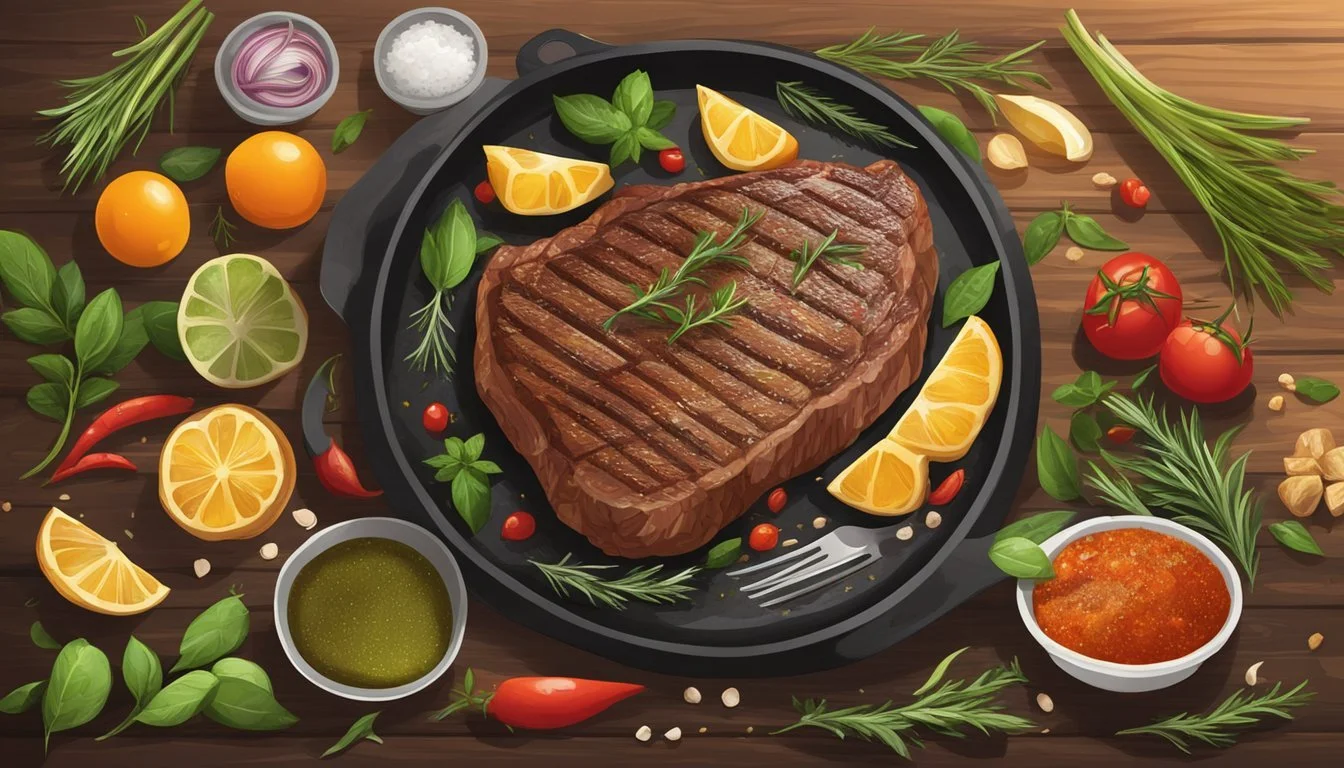Is Carnivore Diet Good for Muscle Growth?
Unpacking the Science
This Article is Part Of Our Guide on the Carnivore Diet
The carnivore diet, a regimen emphasizing the consumption of meat and animal products, presents itself as an unconventional approach to nutrition that has garnered attention in the bodybuilding community. This diet's primary focus on high-quality protein intake aligns with the fundamental requirements for muscle growth and repair, which is crucial for athletes seeking increased muscle mass and strength. Protein serves as the building block for muscle tissue, and by supplying the body with ample amounts, the carnivore diet may potentially support the continuous cycle of muscle protein synthesis.
In muscle-building endeavors, achieving a caloric surplus is essential as it provides the body with the necessary energy to fuel workouts and the subsequent muscle recovery process. The carnivore diet, by its nature, facilitates the consumption of calorie-dense foods, enabling individuals to meet their increased energy demands without the need to consume carbohydrates or other food groups typically associated with traditional diets. This aspect of the carnivore diet might appeal to those who aim to streamline their nutrition toward the singular goal of muscle enhancement.
Carnivore Diet Fundamentals
The carnivore diet focuses on the consumption of animal products and excludes most other food groups. It emphasizes high protein and fat intake from animal sources, with a stark comparison to plant-based diets.
Definition and Key Principles
The carnivore diet is characterized by an exclusive consumption of animal products. Its key principles rest on the assumption that the human body thrives on animal protein and fats while eliminating carbohydrates, including those from vegetables and fruits. Meat, particularly red meat, organ meats, and other animal-based food items like seafood, eggs, and certain dairy products form its cornerstone. This diet provides a high intake of protein and fat, and it can be seen as an extreme form of the ketogenic, or keto, diet, which also emphasizes low carbohydrate intake but allows for more variety in food sources.
Comparison with Other Diets
When compared to other popular diets, the carnivore diet differs significantly. Unlike the paleo diet, which includes fruits and vegetables, the carnivore diet strictly eliminates these plant-based foods. It stands in direct contrast to vegan diets that exclude all animal products. Both the paleo and vegan diets include plant-derived foods, such as fruits, vegetables, and grains, whereas the carnivore diet does not.
Foods to Eat and Avoid on a Carnivore Diet
Foods to consume on a carnivore diet are solely from animal sources and include:
Meat: beef, pork, lamb, game meat
Organ Meats: liver, kidneys, heart
Seafood: fish, shellfish
Eggs: chicken, duck, and other poultry eggs
Dairy: selected options like butter and hard cheeses (low-lactose)
In contrast, foods to avoid span all plant-based foods:
Vegetables
Fruits
Grains
Processed foods: counters the diet's principle focusing on whole animal products
By adhering strictly to animal-sourced foods, the carnivore diet provides a dietary framework centered around protein and fats, with its suitability for muscle growth being debated within nutritional science circles.
Nutrition and Muscle Growth
Nutrition plays a crucial role in optimizing muscle growth, with adequate protein intake, micronutrient balance, and attention to potential nutrient deficiencies being key components.
Protein's Role in Muscle Synthesis
Protein is fundamental for muscle synthesis, as it supplies the amino acids necessary for building muscle tissue. For muscle growth, animal-based protein from a carnivore diet typically provides all essential amino acids, making it highly effective for muscle synthesis. Bodybuilders may require a daily intake of 1.8-2.7 g/kg of protein to support muscle growth.
Micronutrients and Their Importance
While macronutrients like protein are often highlighted, micronutrients play an equally significant role in health and muscle function. Vitamins such as Vitamin D and Vitamin C, and minerals like magnesium, zinc, and iron are essential for various bodily functions, including muscle contraction, oxygen transport, and the synthesis of muscle protein. Adequate intake of these micronutrients is associated with better muscle health and recovery.
Vitamin D: Important for bone health and muscle function.
Magnesium: Aids in muscle contraction and recovery.
Zinc: Essential for protein synthesis and immune function.
Iron: Crucial for oxygen transport in the blood.
Omega-3 fatty acids: Can help reduce inflammation and support muscle repair.
Addressing Potential Nutrient Deficiencies
A carnivore diet rich in meat can lead to excellent protein and certain mineral intakes. However, it can also have potential nutrient deficiencies due to the absence of plant fibers and certain vitamins typically found in fruits and vegetables. Supplementation may be necessary to prevent deficiencies. For instance, individuals may need to supplement with fiber, vitamin C, and possibly omega-3 to balance their diet and support overall health.
Fiber: Important for digestive health, may need supplementation due to absence in an all-animal-product diet.
Vitamin C: Vital for immune function and collagen synthesis, typically obtained from fruits and vegetables.
Omega-3: May need supplementation, especially EPA and DHA, for anti-inflammatory effects and heart health.
Dietary Fats in Muscle Building
Dietary fats play a crucial role in muscle growth, notably through their involvement in hormone production and energy supply. The right balance of fats is essential for bodybuilders aiming to optimize muscle gains.
Saturated and Unsaturated Fats
Saturated fats, found in animal products like beef, pork, and lamb, are a key energy source for the body and are particularly useful in a carnivore diet, which emphasizes meat consumption. Unsaturated fats, especially omega-3 fatty acids, contribute to overall health and should not be overlooked. For muscle builders, fatty cuts of meat can provide both types, supporting bodily functions imperative to muscle growth.
Cholesterol and Hormone Production
Cholesterol, found in foods like eggs, is a building block for testosterone—a hormone that plays a significant role in muscle synthesis. A diet adequate in cholesterol can support the body's natural hormone production, which in turn, can aid in muscle building.
Impact of Fats on Inflammation and Recovery
Fats, particularly omega-3s, are linked to reduced inflammation. This property is important for recovery post-exercise because it helps to repair muscle tissues, making them stronger. On the carnivore diet, consuming fish or fish oil supplements can aid in obtaining these beneficial fatty acids, thus aiding in inflammation management and improved recovery times.
Practical Considerations for a Carnivore Diet
When adopting a carnivore diet for muscle growth, individuals must pay close attention to meal planning, hydration, and supplementation to optimize results and maintain health.
Meal Planning and Preparation
On a carnivore diet, meal planning revolves around animal products, which should include a variety of meats to provide different amino acid profiles essential for muscle synthesis. Meal timing and eating frequency can be adjusted based on personal preferences or performance goals, but typically involve consuming 2-3 meals per day to meet protein requirements. Preparation methods that preserve nutrient content, such as slow-cooking or roasting, are preferable. For instance, incorporating bone broth is advantageous for its collagen content and electrolytes.
Hydration and Its Role in Muscle Function
Hydration is paramount for muscle function and overall health. Individuals should aim to consume adequate water—typically 3.7 liters for men and 2.7 liters for women daily. Besides water, the carnivore diet naturally includes fluids with high electrolyte content, such as bone broth. Adequate hydration supports protein metabolism and can help prevent muscle cramps during workouts.
Supplementation and Carnivore Diet
While the carnivore diet is rich in proteins and fats, it may lack certain vitamins, minerals, and fibers found in plant foods. Supplementing with vitamins such as vitamin D and vitamin C, and minerals like magnesium can fill nutritional gaps. Creatine supplementation may be beneficial for muscle growth and energy production. Since fibers are absent in animal products, one should monitor digestive health carefully, possibly incorporating a fiber supplement if necessary.
Training and Performance
In the realm of the carnivore diet, its potential effects on training and performance are scrutinized particularly focusing on strength training, cardiovascular exercises, fat adaptation, and muscle recovery which are pivotal for athletes seeking muscle gain and improved strength.
Strength Training and Carnivore Diet
Strength trainers on a carnivore diet prioritize high protein intake, which aids in muscle synthesis and growth. They generally consume meats rich in essential amino acids necessary for muscle repair and strength gains. Protein, a cornerstone of the carnivore diet, is consumed at levels of 1.8-2.7 g/kg of body weight, which aligns with the recommended amounts for muscle growth. For optimal strength gains, ingesting calories above maintenance levels -- 3800 calories for males and 2000 calories for females daily -- is also suggested.
Cardiovascular Exercise and Fat Adaptation
When individuals transition to a carnivore diet, their bodies undergo fat adaptation, a metabolic shift whereby the body becomes efficient at using fat for fuel, which could benefit cardiovascular training. This adaptation may facilitate sustained energy during cardio workouts and can contribute to fat loss over time. However, the diet's impact on endurance and performance varies from person to person.
Muscle Recovery and Diet
Adequate muscle recovery is essential for improving performance and promoting muscle gain. The carnivore diet, rich in animal proteins and fats, helps provide the necessary nutrients for repair and growth. Sleep, an influential recovery factor, might also be affected by dietary changes, underscoring the need for individuals to monitor sleep quality and quantity as it is directly correlated with recovery efficacy.
Health Considerations and Risks
When considering the carnivore diet for muscle growth, one must also pay attention to the potential health implications and risks that come with a high intake of animal products.
Heart and Cardiovascular Health
Cholesterol and Heart Disease: A carnivore diet typically increases the intake of saturated fats and cholesterol, which are abundant in animal foods. The relationship between saturated fats, cholesterol, and heart disease is complex, with some studies suggesting that elevated levels of LDL ("bad") cholesterol can lead to an increased risk of heart disease.
Gut Health and Microbiome Diversity
Microbiota and Digestion: The absence of fiber-rich plant foods in the carnivore diet can affect gut health by reducing microbiome diversity. A diverse gut microbiota is associated with better digestion and overall health, whereas a lack of diversity may contribute to health issues such as inflammation and reduced immune function.
Long-Term Health Outcomes
Chronic Diseases and Lifestyle: The long-term health outcomes of the carnivore diet are not well-documented. However, health professionals often warn against diets high in red and processed meat due to potential associations with chronic diseases. People adapting to such a restrictive lifestyle may experience nutrient deficiencies and increased risk of certain inflammatory conditions.
Carnivore Diet Beyond Muscle Growth
While the carnivore diet is primarily recognized for its potential in muscle building due to its high protein content, it influences other aspects of health and fitness, such as weight management, mental clarity, and performance in competitive fitness.
Weight Management and Fat Loss
The carnivore diet's approach to weight management hinges on its macronutrient composition, primarily proteins and fats, which can aid in fat loss. It inherently eliminates most carbohydrate sources, which may lead to a caloric deficit and subsequent weight loss if energy expenditure exceeds intake. Body composition shifts can occur as the diet may help preserve muscle mass while reducing fat stores.
Mental Clarity and Energy Levels
Adherents report improvements in mental clarity and sustained energy levels, attributes possibly linked to minimizing sugar and processed foods. It is thought that the mental focus experienced could stem from stable blood glucose levels, which is an important consideration in managing cognitive functions and day-to-day energy levels. However, scientific evidence is still needed to substantiate these anecdotal claims.
Bodybuilding and Competitive Fitness
For those in bodybuilding and preparing for competition, the carnivore diet's high protein content supports muscle repair and growth. Notable too, is its consistency with intermittent fasting, a technique used by some athletes to improve muscle definition and optimize body composition. Competitors might find aligning their calorie needs with this diet practical for maintaining muscle mass while reducing body fat to achieve the desired physique for competitive performance.



